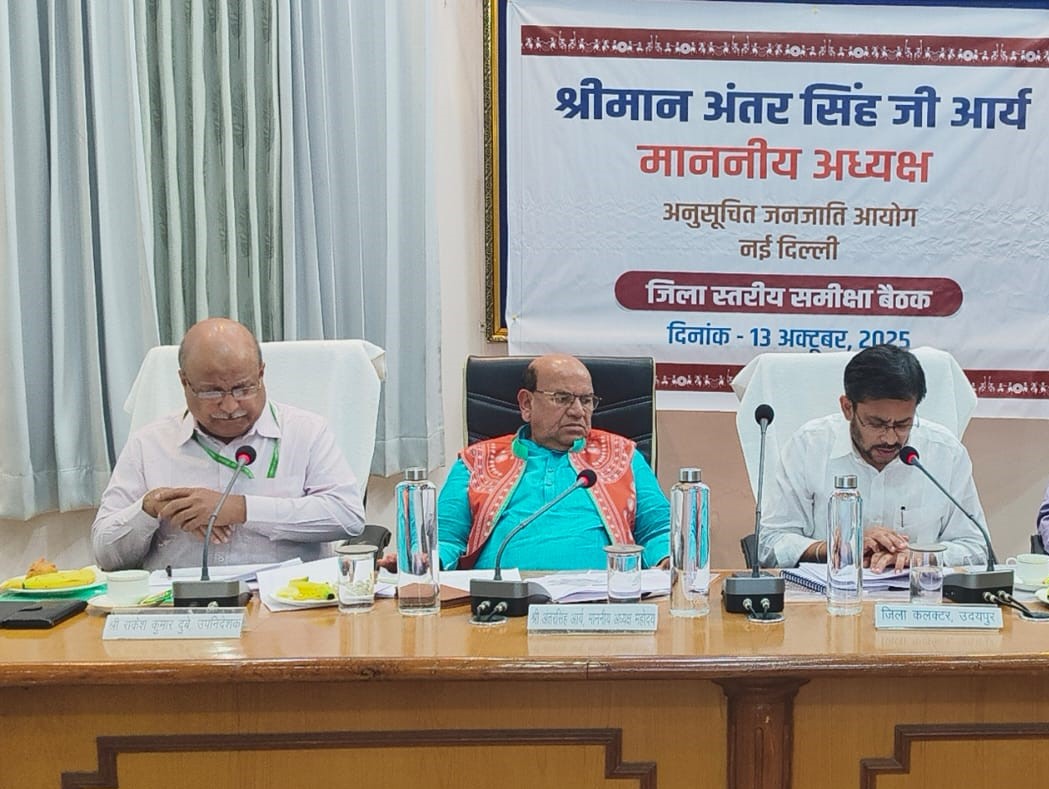#### Focus on Education, Welfare and Forest Rights for Tribal Communities
National Commission for Scheduled Tribes Chairman Antar Singh Arya reviews progress during Udaipur visit

Udaipur. Chairman of the National Commission for Scheduled Tribes (NCST), Mr. Antar Singh Arya, held a district-level review meeting at the District Council auditorium on Monday to assess the implementation of welfare schemes and the overall progress of tribal communities in Udaipur district.
Mr. Arya highlighted that according to the 2011 Census, India is home to 11.43 crore tribal citizens, and the Commission’s core objective is to ensure their protection, empowerment, and socio-economic development through effective implementation of government schemes.
He emphasized that Udaipur is a tribal-dominated district, urging officials to visit tribal areas frequently and even stay overnight in villages to understand ground realities and challenges. He appealed to all departments to work with honesty, empathy, and commitment, noting that tribal people are hardworking and humble but often hesitant to express their problems.
PM-Kisan Benefits for Forest Land Patta Holders
Mr. Arya directed that all beneficiaries holding Forest Rights (Vanadhikar) pattas should also be included under the PM-Kisan Samman Nidhi Yojana, as per the government’s existing provisions. Officials were instructed to ensure that any eligible but excluded households are covered within one month.
For environmental protection, he suggested planting neem, karanj, and mahua trees on vacant lands along roads built under PMGSY and State Highway projects through MNREGA.
District Collector Namit Mehta instructed officials to act upon the Chairman’s directions immediately. District Council CEO Riya Dabi presented the progress made under the “Dharti Aaba Tribal Utkarsh Abhiyan”, detailing awareness camps, village action plans, and Gram Sabha approvals conducted on October 2.
She further informed that under the “Aadi Karmyogi Abhiyan,” camps were organized at panchayat levels to disseminate information on government schemes. Over 17,000 tribal citizens have been registered on the Aadi Karmyogi portal, and a comprehensive database of unserved tribal families has been prepared.
Review of Schemes and Progress
The Commission reviewed progress under several key initiatives, including:
Ayushman Bharat, PM Ujjwala Yojana, PM Awas Yojana, Van Dhan Vikas Kendra, PM-Kisan Yojana, PM Fasal Bima Yojana, PM Mudra Yojana, Soil Health Card scheme, and mobile connectivity in unserved tribal hamlets.
Mr. Arya also discussed data related to education and health, such as literacy rates, school enrollment, pre- and post-matric scholarships, skill development, and institutional childbirths among the tribal population.
He expressed concern over the high poverty rate and low literacy levels among Scheduled Tribes, particularly among women, and called for serious efforts to address dropout rates, malnutrition, and maternal health issues.
Expressing dissatisfaction over the rejection of large numbers of forest rights claims, he directed a comprehensive review of these cases. Arya also ordered that mobile towers installed in remote regions must be made operational immediately to improve connectivity in hilly and forested zones.
TAD Deputy Commissioner Ragini Damor presented detailed statistics on the district’s tribal population, literacy, BPL status, aspirational blocks, and development programs through a PowerPoint presentation. Earlier, Deputy Director R.K. Dubey briefed the participants about the Commission’s formation, objectives, and functioning.
Concerns Over Police Action in Tribal Land Disputes
Mr. Arya raised questions regarding the closure of a large number of land dispute cases involving Scheduled Tribe landholders, particularly where non-tribal encroachments had occurred.
He noted that several cases were wrongly categorized as civil in nature and closed, despite legal provisions mandating penalties and prosecution upon confirmation of land encroachment by revenue authorities.
He further pointed out that many such cases had been closed in the past three years despite clear evidence of encroachment. The investigation period for such cases has now been reduced from 90 days to 60 days, and reports have been sought for all matters pending beyond that timeframe. The Chairman instructed officials to ensure time-bound investigation and legal action in all land-related cases involving tribal communities.
Press Interaction and Plantation Drive
After the review meeting, Mr. Arya addressed a press conference, answering queries from journalists. He stated that the Government of India is implementing time-bound missions to strengthen tribal communities and improve basic infrastructure and service delivery in tribal regions.
Later, the Chairman also participated in the “Ek Ped Maa Ke Naam” campaign by planting a sapling at the Circuit House. Udaipur MP Mannalal Rawat and other dignitaries were also present on the occasion.
साभार :
© CopyRight Pressnote.in | A Avid Web Solutions Venture.






